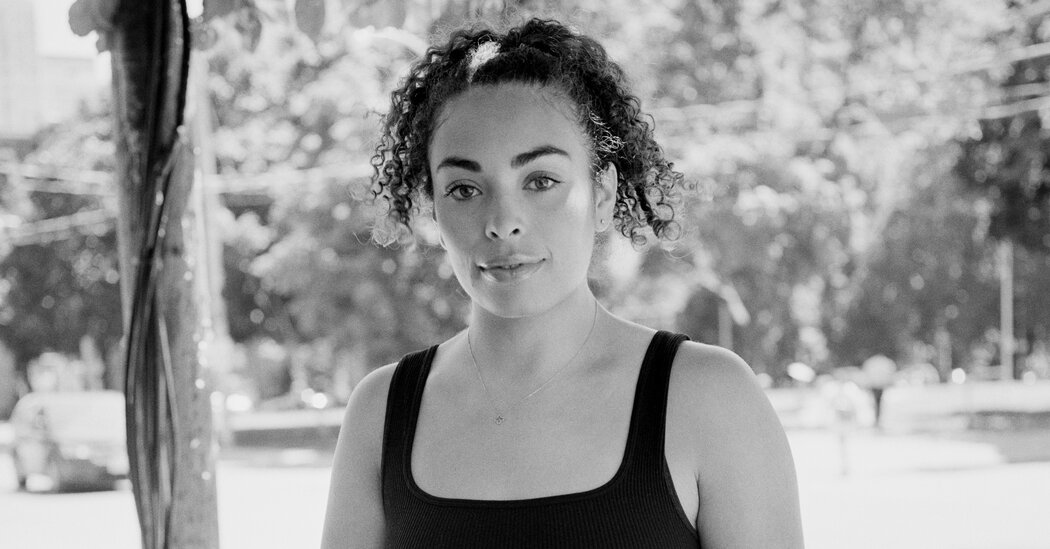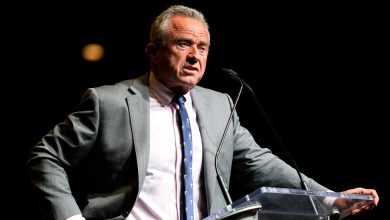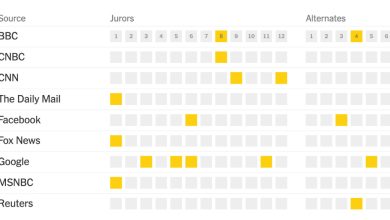
In Sarah Nurse, a Found Voice for Hockey
TORONTO — Not even six years ago — before Sarah Nurse’s Olympic medals, before the Olympic record she set, before the Cheerios boxes and Barbie dolls bearing her image — Canada was content to leave her off its national women’s hockey team.
It was early 2017, and Canadian executives were skeptical that Nurse was ready for the world championship stage. Maybe, she was told, there would be a place at the next year’s Olympics.
Nurse made that Olympic team, and then another, and is now among the most ascendant women in hockey. Six months after she became the first Black woman to win an Olympic gold medal in hockey and set the single-tournament Olympic points record, Nurse is central to her country’s ambitions in the world championship competition that began Thursday.
Her turn at the top of Canadian sports is unfolding as she is increasingly summoning her own voice. One of the few Black people in hockey’s most rarefied rooms, now or ever before, she is exchanging her yearslong caution for candor, chasing away worries about backlash and the wrenching, lingering sense that she “never really always felt like I fit in.”

Nurse with her new puppy, Romeo, at Grit Athletics in Toronto.Credit…Narisa Ladak for The New York Times
“I was a girl playing hockey; I was a biracial Black girl playing hockey,” Nurse, 27, said in Toronto this summer. “I’ve just always had this weird sense of belonging where I’m like, ‘Oh, can I sit at this table? Do I belong here? Do I fit in with the whole crowd?’”
The crowds seem to follow her now. On Wednesday, EA Sports said that Nurse would be the first woman to appear on the cover of its hockey video game. Then on Thursday, when Canada opened its world-championship schedule with a matchup against a formidable Finnish squad, Nurse scored her team’s first goal and assisted in its second in a 4-1 victory.
Asked whether Nurse, who calls pressure “a privilege,” would have soared without Canada’s rejection in 2017, her coach from her University of Wisconsin days replied, “Probably not.”
“She probably got to the point where she was a much better player having navigated through that space than maybe she would have been,” said the coach, the former American Olympian Mark Johnson.
Up from Hamilton
The daughter of a Trinidadian immigrant and a mother whose lineage in Canada traces for generations, Nurse is one of the newer entries on a family tree that is a treasury of athletic talent.
Her father, Roger, was one of Canada’s finest lacrosse players. An aunt, Raquel Nurse, was a celebrated point guard at Syracuse University and married Donovan McNabb, the quarterback who made six Pro Bowls. Their daughter, Lexi McNabb, is a freshman on Syracuse’s basketball team.
Sarah Nurse’s other cousins include Kia Nurse, an Olympian in 2016 and 2020 and a W.N.B.A. all-star in between, and Darnell Nurse, a top-line defenseman for the Edmonton Oilers. Their father, Richard Nurse, played in the Canadian Football League.
As a child in Hamilton, near Toronto, Sarah Nurse, dazzled by graceful power and sparkly dresses, imagined that she wanted to be a figure skater (or a pop star). Her parents signed her up for hockey instead. She competed on boys’ teams and learned that other girls played the sport only when, as a 7 year old, she watched Canada’s women’s team march to an Olympic gold medal in 2002.
To coaches and players, she showed conspicuous promise but sometimes seemed too relaxed. It was only once Stacey Marnoch began coaching Nurse that the prospect felt a bench boss understood her.
Preaching that no approach could fit every player, much less every teenage player, Marnoch offered a blend of independence and fearsome accountability. Perhaps most important, Marnoch sensed that Nurse, who already prized her ability to separate her identity from the sport that would make her famous, would collapse beneath a hockey-centric clamor.
“She’s fiery competitive but doesn’t have that edge to her,” Marnoch said. “She’s laid-back and super chill and turns it on and up when she needs to.”
“Lazy kids don’t play defense, and she was catching people from behind all the time,” Marnoch added.
College coaches noticed Nurse’s speed, her unflappability and her ability to kill penalties. She chose Wisconsin, which was both renowned for its women’s hockey program and large enough for Nurse to revel in relative anonymity.
She played in every game as a freshman and became a prolific scorer for the Badgers, who reached the Frozen Four in all four of Nurse’s seasons in Madison.
Off the ice, though, Nurse was wary as America sank still deeper into tumult. She worried about police brutality, particularly when her father or one of her brothers would travel to visit. As the nation’s mood darkened around the 2016 presidential election, she found herself disconcerted by some of the views she heard in the locker room and saw embraced in Wisconsin, a panorama of political bitterness.
But she was hardly eager to enter the fray fully, or at least not yet. She had long been mindful of what she described as an advantage: “I’m a biracial woman and people can tell that I’m not white, but I also don’t get treated as if I were a dark-skinned Black woman.” She was also uncertain that anyone wanted to hear from her, and so she had said little about race, in society or in her predominantly white sport. (Nurse said she was a teenager before she learned about Angela James, a Black woman who had played for Canada and in 2010 became one of the first women to be inducted into the Hockey Hall of Fame.)
Even when she was among friends, she sometimes held back from correcting slights and dismissals. And on Twitter, she typically talked about hockey and her siblings.
The night before the election, though, after a man wearing a mask of Donald J. Trump pretended to lynch someone impersonating Barack Obama during a football game in Madison, she apprehensively joined the Wisconsin athletes who spoke of being “loved during competition but then being subjected to racial discrimination in our everyday lives.”
The election results quickly drowned out their statement.
Pursuing gold and speaking out
The sting of exclusion from the 2017 world championship team, traceable to misgivings about Nurse’s strength, faded once she made Canada’s roster for the 2018 Winter Games. But the team returned from Asia frustrated, with Canada relegated to the silver medal in women’s hockey for the first time since 1998. The next year, Canada would manage only the bronze in the world championship.
The players embarked on a “soul-searching” period, as some of them would describe it. For Nurse, the calculus was complex. She had an Olympic medal and prospects for another. She also had other interests, including fashion and marketing.
“I was able to realize at 23 that the Olympics were just something I did — somewhere I went, where I played hockey, which I’ve done my whole life and will continue to do,” she said this past June. “But it’s not who I am. It’s like, I am Sarah Nurse. I am an Olympian, but I am also other things. It’s not my whole being.”
The agony — maybe more of a simmering fury — from the Olympic loss to the Americans lingered, though. She wanted a gold medal.
The pandemic arrived in the interim. She stayed with her parents, practiced hockey how she could and found solace in YouTube tutorials on nails and makeup.
Then a Minneapolis police officer murdered George Floyd, a Black man, in May 2020. Hundreds of miles to the east, Nurse, emboldened after years of admiring activists from afar, joined in the international horror.
“It was not an accident,” she said in one tweet. “It’s appalling to see another black person murdered. His life, along with countless others – Not valued. It is NOT enough to sit back and say, ‘I’m Not Racist.’ We all have to be actively AGAINST racism in our society.”
Also troubled by elements of Canadian society, she posted about microaggressions, urged people to attend protests and at one point wrote: “Black Lives are more important than sports. PERIOD. I’m going to need hockey, especially, to understand that.”
Her self-diagnosed timidness was gone, done in by age, the era’s urgency and the independent streak she thought the pandemic had deepened.
“I was able to learn a lot more about myself and where I thought that I fit into the world and put less emphasis on fitting in with a group of people and more of, hey, this is who I am and I can be fluid throughout these groups of people,” Nurse said.
Moreover, she said, she came to accept that her standing as one of elite hockey’s only women of color demanded that she speak more than she had allowed herself to envision.
“People would not be getting this if it wasn’t coming from me,” she said.
Her parents now worry more about the blowback — “you’ve got to get off Twitter,” she tells her father — but people who have long known Nurse said they were unsurprised that, eventually, she was willing to challenge entrenched problems.
“She’s probably gotten more comfortable in her skin than she was five, six, seven years ago, but I think it was always there,” said Johnson, lionized for his two goals in the United States’ “Miracle on Ice” game at the 1980 Olympics and more familiar than most with the rigors of Games fame. “Her platform obviously has changed in the last 15 months.”
Her glittering performance in Beijing, though, nearly did not happen: In the months before the Games, Nurse, recovering from a knee injury, had been uncertain how much she would even see the ice. She did not practice or play with the Canadian team until after Christmas.
Previews of the Games usually mentioned Nurse in passing, if at all. The Americans, the pre-eminent rivals to the Canadians in women’s hockey, were wary anyway.
“There was always a familiarity of, this is the kind of player who is going to have an impact because she plays the game as a pro,” said Joel Johnson, who led the American squad in Beijing and coached teams that faced Nurse when she was at Wisconsin. “I think some people have always known she’s got a capacity to be a leader and great, and then she just crushed it on the ice in the same way.”
She had two assists in Canada’s opening game in Beijing, three goals in the second and a goal and an assist in the third. She recorded a single assist in Canada’s first game against the United States but picked up four in a quarterfinal meeting with Sweden and another four in a semifinal against Switzerland.
As the gold medal game against the Americans approached, Blayre Turnbull, another veteran of Wisconsin on the Canadian team, asked whether Nurse realized she was on the brink of matching Hayley Wickenheiser’s record 17 points at a single Olympics.
No.
All she was thinking about, she recalled later, was how, after starting the Games on the third line, she would be sharing the first with Marie-Philip Poulin and how “I have to be good because I’m playing with Poulin and she’s the gold medal girl.”
But Nurse was offside early, and Natalie Spooner’s goal for Canada vanished.
“I owe you one,” Spooner would remember Nurse saying to her on the bench.
Thirty-five seconds after the disallowed goal, Nurse scored and tied Wickenheiser’s mark. She later recorded an assist on Poulin’s Olympic-winning goal, helping Canada to avenge its 2018 defeat.
The gold medal Nurse craved now sometimes lives in a sock, its recipient scarcely looking at it amid a blur of sponsorships, journal writings, workouts and walks with her new dog, Romeo. Now recognized on trains and in malls, she is considering pursuing another Olympic roster.
But she is not, she said, afraid to move on from the sport, or anything else. Rejection taught her not to be.
“We’re not,” she said, “meant to be pigeonholed.”




